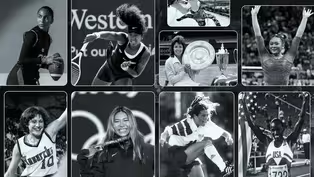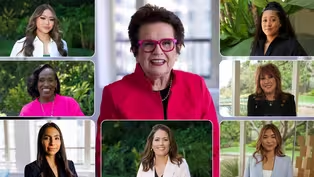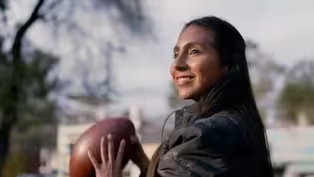
Origins of Title IX
Clip: Season 1 | 4m 1sVideo has Closed Captions
Learn about the legislative history of Title IX.
Discover the story behind Title IX. Billie Jean King shares the legislative history of the law that “opened the floodgates for women’s sports,” led by Reps. Edith Green and Patsy Mink in the House of Representatives and Sen. Birch Bayh in the Senate.
Problems playing video? | Closed Captioning Feedback
Problems playing video? | Closed Captioning Feedback
CORRECTION (Dec. 8, 2023): This program mistakenly refers to two events of the women’s heptathlon as the 60-meter and 1,000-meter run. The program should have referred instead to the 200-meter...

Origins of Title IX
Clip: Season 1 | 4m 1sVideo has Closed Captions
Discover the story behind Title IX. Billie Jean King shares the legislative history of the law that “opened the floodgates for women’s sports,” led by Reps. Edith Green and Patsy Mink in the House of Representatives and Sen. Birch Bayh in the Senate.
Problems playing video? | Closed Captioning Feedback
How to Watch Groundbreakers
Groundbreakers is available to stream on pbs.org and the free PBS App, available on iPhone, Apple TV, Android TV, Android smartphones, Amazon Fire TV, Amazon Fire Tablet, Roku, Samsung Smart TV, and Vizio.
Buy Now
Providing Support for PBS.org
Learn Moreabout PBS online sponsorship- In the 1960s, the Civil Rights Movement was thriving.
The Civil Rights Act of 1964 and the Voting Rights Act of 1965 were both passed, expanding government protections to citizens of all backgrounds.
But a few brilliant people knew that more needed to be done to specifically advance women in all areas of society.
Back in 1969, a part-time teacher at the University of Maryland kept applying for a full-time position, but was told she wasn't being hired because she came on too strong for a woman.
Motivated by this rejection, Bernice Sandler researched her rights and found what she needed-- a 1967 executive order signed by President Lyndon Johnson that barred organizations with federal contracts from discriminating on the basis of sex.
With the order in hand and the help of the Women's Equity Action League, she filed a class action complaint against all universities and colleges in the country.
In 1970, Sandler shared her experience with the U.S. House of Representatives' Edith Green's subcommittee on higher education.
In these hearings, the foundation of Title IX was set, and a bill was formed.
In the House, the legislation was championed by Green and Congresswoman Patsy Takemoto Mink, who worked tirelessly to ensure passage of Title IX.
Mink knew discrimination firsthand as well.
- It's always been my belief that so long as any part of our society, uh, adheres to a sexist notion that men should do certain things and women should do certain things, then we'll never be rid of the basic causes of sex discrimination.
- [Billie] As a child, Mink dreamed of becoming a medical doctor.
But after earning her undergraduate degree from the University of Hawaii, she was rejected from 20 medical schools because of her gender.
Mink pivoted and decided to pursue a law degree instead.
But even after earning her degree, Patsy found it difficult to get work in the legal profession because of her status as a married woman.
- It's very difficult getting into-- into school, and getting into the professions.
I couldn't find a job, and when all of my contemporaries at home say, "Oh, my goodness what you've done to politics at home," and, you know, "I wish we had never heard of Patsy Mink," I'll say, well, it's because of all of your attitudes that drove me into politics.
If you'd given me a job when I came home from law school, I would have been very happy just drawing a paycheck each month.
- [Billie] Patsy Mink eventually found her place in politics, winning a seat in the House of Representatives in 1964, becoming the first woman of color to serve in the U.S. Congress, and a central figure in the Title IX legislation.
Title IX was formally introduced in Congress by Senator Birch Bayh of Indiana, and was its chief Senate sponsor for congressional debate when it finally became law in June of 1972.
It's 37 words.
Within those 37 words, there's the word "activity."
And I knew Senator Birch Bayh pretty well, he's one of my heroes, he said they kept, like, "Should we leave it in?
Should we take it out?
"Should we leave it in?
What does it pertain to?
"We really don't know, but it'll be a catch-all, maybe."
Maybe, they weren't sure if it was even necessary.
- Mm-hmm.
- In 1972, he didn't realize it was gonna open the floodgates for women's sports, but it changed the whole world.
Video has Closed Captions
Preview: S1 | 31s | Billie Jean King and seven icons discuss the past, present and future of women’s sports. (31s)
Video has Closed Captions
Clip: S1 | 4m 1s | Learn about the legislative history of Title IX. (4m 1s)
Naomi Osaka on Her 2018 U.S. Open Win
Video has Closed Captions
Clip: S1 | 4m 9s | Naomi Osaka talks to Jackie Joyner-Kersee about win 2018 U.S. Open win and mental health. (4m 9s)
Nancy Lieberman and Chloe Kim on Being Role Models
Video has Closed Captions
Clip: S1 | 1m 22s | Nancy Lieberman and Chloe Kim talk about being role models for the next generation. (1m 22s)
Julie Foudy on the 1999 Women’s World Cup
Video has Closed Captions
Clip: S1 | 3m 14s | Julie Foudy shares the story of the 1999 Women’s World Cup with Suni Lee. (3m 14s)
Video has Closed Captions
Preview: S1 | 2m 13s | Billie Jean King and seven icons discuss the past, present and future of women’s sports. (2m 13s)
Diana Flores on Her Start Playing Flag Football
Video has Closed Captions
Clip: S1 | 2m 7s | Diana Flores tells Billie Jean King about the beginnings of her flag football career. (2m 7s)
Providing Support for PBS.org
Learn Moreabout PBS online sponsorshipSupport for PBS provided by:
CORRECTION (Dec. 8, 2023): This program mistakenly refers to two events of the women’s heptathlon as the 60-meter and 1,000-meter run. The program should have referred instead to the 200-meter...






















